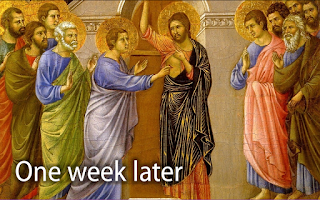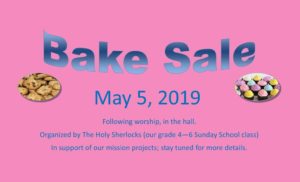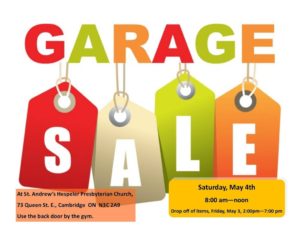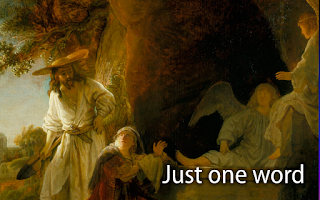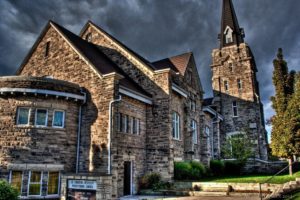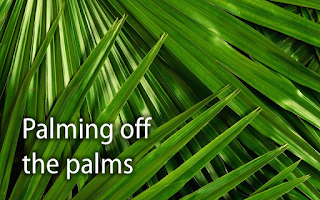Keeping Up-to-Date
One week later
Hespeler, 28 April 2019 © Scott McAndless
Acts 5:27-32, Psalm 150:1-6, Revelation 1:4-8, John 20:19-31
| I |
t had been one week, seven days, 168 hours. It had been one week since everything had changed, since the stone had been rolled away and the power of death had been broken forever. It had been a week since he himself had appeared among them despite the fact that the doors were locked and they cowered in fear of everyone in the outside world. What is more, it had been a week since he had given them, as a free no-strings attached gift, many great things. He had given them his peace – in fact, that had been so important that he had said it twice. He had given them the evidence, imprinted upon his very hands and on his side, of what he had been willing to suffer for them. He had given them his commission, sending them out in his name. He’d given them the gift of the Holy Spirit and, wonder of wonders, he had given them the power to forgive anybody. “If you forgive the sins of any, they are forgiven them; if you retain the sins of any, they are retained.”
Can you imagine what kind of power that represents? All of the people in the world today who are crushed by feelings of guilt, all of those who are so overwhelmed by the shame that has been piled upon them all their lives long, he had given the disciples the ability to proclaim pure forgiveness and liberty. Mind you, it was not just that they were able to proclaim that God could forgive such things. He had told them that the grace of God is so abundant in this moment that they only have to say it and it will be so.
And now it is one week later – seven days, 168 hours, and I just have one question: what have they done? What have they done with the knowledge that death has been defeated? What have they done with that peace that passes all understanding? In what ways have they exercised that awesome power to forgive? What have they already accomplished of what they have explicitly been sent to do?
I mean, I understand that there is a limit to what you can do in seven days. I don’t think that anyone would have expected them, in that time, to preach the gospel to the ends of the earth! Nor do I expect that they would have advanced so far as to proclaim the forgiveness of God to Potius Pilate or Judas Iscariot. I mean you might encounter some psychological barriers to doing that! No, I’m not saying that they should have finished in a week, but think of the start you could make in that time. You could tell hundreds the good news. You could proclaim relief to many of the broken hearted. You could bring peace to many a troubled heart. So, I don’t think that it’s unreasonable to expect that there should have been something that happened in that week.
Jesus had already done everything. He had defeated death and its power, he had vanquished sin in just three days. I don’t think it’s unreasonable to ask what they have done with the knowledge of that in seven.
So, what can we observe in the scene seven days later? What has changed? Well, apparently not very much. We find the disciples exactly where we left them a week ago. They are in the same upper room. And the door is still locked which is surely an indication that they still cower in the same fear. And how many people have they told of what they learned a week ago? Have they told tens or hundreds or thousands? Well, it would appear that they’ve only told one. They have told Thomas.
Everybody always gets down on Thomas. “Doubting Thomas” we call him. He has become the punchline of many a joke and comic strip. That’s all anybody knows about him and we assume that he must have doubted everything all the time. Of course, that’s not true. There’s only this one story of the one time he doubted something and, sure, it was a pretty important thing, but still it was just that one time.
He is not mentioned a lot otherwise in the gospels, but, where he is, he actually comes off pretty well. He was the one, for example, who, when Jesus was ready to go off to Judea to help a sick friend at a very dangerous time, responded by saying, “Let us also go, that we may die with him.”He was obviously very brave and very committed to Jesus.
So I actually think that our tradition has been a bit unfair to poor old Thomas. Yes, he had done absolutely nothing for a whole week after the resurrection of Jesus because he was waiting for some evidence. He wanted to see with his eyes and feel with his hands. But the other guys? They had seen and felt the evidence for themselves. Jesus had shown them his hands and invited them to feel his side.
And what have they done with that? It says that they believed, but their belief has not led to action. They believed, but they don’t seem to have had enough conviction in their belief to have won over the one person that they had got around to telling about it. Is this story really the story of Doubting Thomas? Or is it the story of the disciples whose belief in Jesus really didn’t make all that much difference?
It has been one week, seven days, 168 hours since he rose. It has been one week since we stood together and proclaimed the incredible truth: “Jesus Christ is risen. He is risen indeed.” It is a week since we declared our faith that Jesus has conquered the power of death and sin and that, because he lives, we shall live also.
I’m just wondering, is it fair to ask what we have done with that knowledge in the past week? Mind you, I am not asking what you have done with it since you first heard about it or since you first came to faith in Jesus. I’m assuming, I’m hoping that we all assume, that the fact that we believe that Jesus Christ rose from the dead makes a difference in the overall picture of our lives, but to ask what difference it made this past week is a little different. To ask what difference it will make next week is also a little different.
The risen Christ has come to you with the words, “Peace be with you.” But have you received that peace? Have you become a person of peace? Does the fact that Jesus has vanquished the power of sin and hatred not mean that you don’t need to be aggressive towards anyone who disagrees with you, or defensive towards anyone who threatens you? Does fact that he won not by fighting back but rather by obedience and faith in God not mean that you can be a person of peace in all of your interactions?
And Jesus’ resurrection has unleashed the power of God’s forgiveness – a power that Jesus has given to you as his follower. How have you exercised that power this week? Do you realize that anyone who says that something is unforgivable or that God cannot forgive certain things is denying the power of Jesus’ resurrection? God’s answer to the world’s misery is now grace and forgiveness because of Jesus. There is really only one thing that keeps forgiveness from being the way of the world today and that is our failure to practice it. As we cling to our resentments or our hatreds, we keep the power of the resurrection from reigning in this world. So, it is the right question to ask you, if you are follower of Christ, who you have forgiven this week. I know that there are things you have to overcome – that there are exercises of grace that you have to build towards over time – but have you started? I think that Jesus would ask no less in one week after Easter.
Most important of all, it has been one week since you were given the gift of the Holy Spirit and sent out. “As the Father has sent me, so I send you,” he has said. And do you recognize what it means to be given such a status – to be sent out into the world to represent God’s anointed one whom he sent into the world? It means that when you go out into any situation, you are not representing yourself as you bring words of peace or forgiveness or reconciliation. You are speaking for the great king over all the earth and he has given you authority to do so.
Can you imagine a Canadian ambassador, sent to represent the interests of the Canadian people, failing to speak up if the country to which she was sent was descending into chaos and she had the words, given to her by the government, that could help that country find peace and prosperity for all with Canada’s help? Of course not. To fail to do so would be a dereliction of duty. Yes, you have to be careful and respectful when you speak – you need to appreciate where other people are coming from. Every diplomat knows that, but when you are sent, you have to remember who you represent.
So, in the last week, how have you behaved as one who was sent by Christ into the world? Have you done that or have you fallen into the trap that we all admittedly fall into from time to time – the trap of thinking that you represent only yourself in this world? Are you looking out only for your own interests and your own short-term gain? When that is the case (and, yes, it is the case for all of us at least sometimes) you are not living out the truth that Jesus is risen. In the aftermath of the resurrection, he gave you the spirit and sent you in his name.
I don’t think it will be a surprise to any of you if I tell you that doubt seems to be on the rise in the world today. There are many today – more than was once the case – who openly doubt things like the existence of God or the resurrection of Jesus. But, just like I am not inclined to blame Thomas for his doubts, I am not willing to blame the modern doubters for failing to see these things as we see them. I know that they will say that the issue both for them and for Thomas is the question of evidence: “Unless I see the mark of the nails in his hands, and put my finger in the mark of the nails and my hand in his side, I will not believe.” And I’m fine with that. I get that the lack of concrete evidence can be a problem. If it was just a matter of forensic evidence – if that were all we had to go on – I’m not sure that it would be enough for me either.
The thing that will ultimately convince you and me and all the doubters in the world that is true is not that. It did not convince Thomas either by the way. When he was invited to put his finger in Christ’s hands and reach out his hand and put it in his side, his need to do so disappeared and he instead fell to his knees in worship. The proof, for all of us, comes in living it. That is why it matters what you did with your knowledge of the resurrection over the past week. That is why it matters what I did with it. And if we all dared to practice that peace, to practice that kind of forgiveness, to dare to take that authority and spiritual power that the risen Jesus gives us, I do not think that rising doubt in the world would be the problem one week after Easter.
Bake Sale, Sunday, May 5th, following church
Please help support our Holy Sherlocks class.
They have decided to support two projects with this bake sale:
Sleeping Children Around the World
&
Keep Hope Alive, Plant an Olive Tree in Palestine
Donations of peanut-free baked goods would be appreciated.
Garage Sale! May 4th, 8:00 am – noon.
It's Garage Sale time!
It's a great time to clean out your closets and cupboards.
One person's junk is another's treasure!
Please no electronics or clothes.
Sunday, April 28, 2019
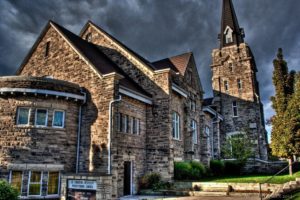 |
Our scripture readings for Sunday are:
If you have any questions or comments about the scripture readings or message please feel free to contact Rev. Scott McAndless, smcandless@standrewshespeler.ca |
Just One Word
Hespeler, 21 April 2019 © Scott McAndless – Easter
Isaiah 65:17-25, Psalm 118:1-2, 14-24, 1 Corinthians 15:19-26, John 20:1-18
| S |
ometimes it can happen to any of us – we get caught in a story that we are telling to ourselves. It is a story that may not be true but, because we keep telling it to ourselves, it takes us in a spiral of deeper and deeper despair. That was what Mary was doing and it took one word – just one word – to change everything for her.
Mary had gone out to the tomb, the place where they had laid him, as soon as she could early in the morning. The sun was barely coming over the horizon when she arrived there. And her heart was only fixed on one thing. Her Lord, the only one who had ever given her reason to hope, was dead. She had come to weep and to mourn. She just wanted to throw her arms one last time around the body of the man who had meant everything to her, just to say goodbye, to say that she wished she could have done something to save him. It wouldn’t have really made anything better, of course, but at least she could have gotten some closure.
But it seemed, as she drew near, that even the solace of grief was to be denied her. The stone was rolled away, the tomb apparently empty. There was no body to grieve over. The one word that would help her on this day was not the word grief.
She fled, distraught, looking for someone, anyone to help her makes sense of what was going on. She fled to the men, the disciples who were cowering in fear someplace with her disturbing news, “They have taken the Lord out of the tomb, and we do not know where they have laid him.”
Immediately Simon Peter jumped up and mansplained the situation to her, “Don’t you worry your pretty little head, Mary. I’ll sort this out and make everything alright.” And he ran out to the tomb and another one of the men followed quickly after. Mary followed them slowly, not running as swiftly as they for she felt no great rush to return to the site of her terrible loss. But she could see the men as they turned what should have been an inquiry into a competition.
They were having a race. One sprinted ahead and then the other overtook him. Each one was clearly trying to get to the tomb first. She could just imagine how they would report it to the others later. “I was the first one to get to the tomb,” one would say, completely ignoring the fact that Mary had been the first, of course. “And then the other would protest and say, “well, maybe you got there first but I was the first one who was brave enough to go inside.” And then the other would answer, “Well, I’ll grant that you were the first one to barge in and mess everything up, but I was the first one to believe and doesn’t that count for more?” And then they would spend the next few decades arguing with each other over who was more faithful to his memory and who was most qualified to lead.
By the time that Mary arrived at the tomb again, the two men were heading away, still arguing together. She had to admit that they had really been no help. It was quite clear that the one word that would change everything for her on this day was not the word authority or leadership. Theirs had been no help. She was left feeling totally abandoned. She dissolved into tears, weeping and wailing aloud as she had never done in her life. This day was just getting worse and worse.
As Mary wept, she leaned over and looked into the still-empty tomb, it was no longer exactly as empty as she remembered. Two men were there, sitting where the body had been laid. But were they men? Their clothing was so bright; Mary wasn’t sure she could trust her eyes, especially when they were so filled with tears. It probably didn’t matter what they were though, because they didn’t give her any useful information anyways, just asked her why she was crying. And Mary was still stuck in the story she had been telling herself all morning – the story of what she had come looking for: “They have taken away my Lord, and I do not know where they have laid him.” So clearly, the word visionor the word angel was not to be the word that would change anything.
But here is the truly amazing thing: what happened next didn’t help her either. And what happened next was actual visual proof.
What would it take for you to believe – to say that it was absolutely true beyond a reasonable doubt that Jesus rose from the dead? Most people would say, I suspect, that it would take the risen Jesus standing right there in front of you. Well, Mary got that. She turned around and Jesus was standing right there.
But, with Jesus standing right there, Mary was still stuck on the same story she had been telling herself all morning – that the body had been stolen and she was simply being denied her grief. “Sir, if you have carried him away, tell me where you have laid him, and I will take him away,” she said to the supposed gardener.
Now people have puzzled over this one for centuries. How was it possible that Mary could have failed to recognize this man that she had followed all over Galilee for months if not years? Had Jesus’ appearance has somehow been changed as a result of the resurrection? Was Mary blinded by her tears? There might be some truth to both of those ideas, but the bottom line, I think, is something else.
I think we’re being taught something important about the resurrection. It it’s not something that anyone is going to prove to you simply with evidence. If somebody comes back from the dead, you will find a reason not to believe it.
You might think, and I myself might have once thought, that it was my job to get up here and convince you with logic and reason and evidence that about 2,000 years ago a Jewish man from Nazareth rose from the dead and that that changes everything, but I have come to believe that testimony and evidence will never do that for you. The word that changes everything is not proof.
What was the one thing, then, that changed everything for Mary? It was just one word. And that word, you’ve guessed it by now, was Mary. It wasn’t that the risen Jesus had spoken to her. He had already spoken to her at that point, had asked her why she was weeping. That expression of human concern was important, but it wasn’t what changed everything. The change came when Jesus connected to her and her alone. It was personal and private. It was her name.
My friends, this is the one thing that I want you to understand on this Easter day. The resurrection of Jesus is not merely an historical event. I mean, yes, it happened at a particular moment in history. If you had been there you would have experienced something extraordinary.
But to grasp that part of it is only to grasp the smallest part. The resurrection of Jesus is something that becomes true when it happens to you. When the risen Jesus looks you in the eye and calls you by name – calls out Mary or Peter, Paul or Helen. You are who he rose for. You are the one he suffered it all for. He wants you to know it, not merely with your brain but rather with everything that you are. That changes everything.
Sunday, April 21, 2019
Why I Made a Controversial Notice of Motion
About a month ago, I made a notice of motion at a meeting of my Presbytery – Waterloo-Wellington. A notice of motion is basically a heads-up – an indication that you intend to put forward a motion for debate that will bring significant change or that might be controversial.
This was the notice that I gave:
At a future sederent, I will move or cause to be moved:
That the Presbytery of Waterloo-Wellington insert in an appropriate place in its standing orders the following section:
Recognizing Affirming Congregations:
Recognizing that there is a variety of opinion and theological understandings of the place of people who identify as LGBTQ+ in the life of the congregations of our presbytery, the Presbytery of Waterloo-Wellington would like to affirm that an inclusive and affirming approach is valid and has been chosen by a number of our congregations. We reflect this affirmation in the following standing orders of our presbytery.
- The Presbytery will perpetually extend the philosophy of amnesty adopted by the General Assembly to enable to work of the Rainbow Communion to all of the work of the Presbytery; the Presbytery will engage in no discipline regarding the revelation that any member of Presbytery or member or adherent in any congregation within its bounds identifies as LGBTQ+.
- The Presbytery will engage in no discipline of a teaching elder who, with the support of his/her session, presides over or participates in any marriage that is considered legal in Canada. The presbytery will not compel any minister or session to perform a particular marriage. The presbytery will recognize the status of any legal marriage in Canada.
- Presbytery will continue to exercise oversight and discernment over every student and candidate for ordination. The sexual orientation or gender identity of any potential candidate will not be entertained as a cause to call their call to ministry into question.
- In processing calls, the Presbytery will continue to exercise all due diligence as directed by the Book of Forms. The Presbytery does not consider that the sexual orientation or gender identity of a potential candidate can, in itself, cause a call to be invalid.
- Interim moderators must not prevent congregations from considering a candidate solely on the grounds of gender identity or sexual orientation.
- The Presbytery will not use its authority to compel any congregation to take specific actions to be more affirming. It will continue to engage in dialog and discussion on the matter.
I would like to take the opportunity in this blog post to offer some explanations for why I decided that it was necessary to make such motion a meeting of the Presbytery (called a sederent) in the near future.
The state of the discussion
Many people will know that the Presbyterian Church in Canada has been talking about the place of people who identify as LGBTQ+ in the life of the denomination for quite some time – for a couple of decades really. There have been some changes and certainly many shifts in attitude in that time, but the denomination as a whole has not really resolved anything. Another report, prepared by former moderators of the General Assembly will be presented to the General Assembly this June. I certainly hope and pray that it will enable some constructive discussion, but I have little expectation that it will resolve the question in any conclusive way.
 |
| Presbyterian congregations joyfully participate in a Gay Pride event |
But meanwhile, a number of congregations have come to some resolution. Leaders in those congregations, both clergy and lay, have taken a serious theological, biblical and ecclesiological look at the question and come to the conclusion that not only is it possible for them to welcome all members of the LGBTQ+ community into the lives of their congregation but that this is a faithful way for them to live out the Christian gospel.
Thus, these openly welcoming and affirming congregations exist. They are doing their best to live out the gospel and there is much evidence that God is at work in their midst. That is not to say that all such congregations are thriving and growing numerically. They face the same challenges that all of our congregations face in terms of demographic and societal change. Some are growing, some are holding steady, some are shrinking. Affirming congregations don’t seem to differ significantly from the overall trends. I’m not suggesting that what they have done is a panacea for all congregations. Nevertheless, the evidence is there that the Holy Spirit is at work in those congregation. The Spirit is present in changed and changing lives, in meaningful mission and purpose. That is the evidence that matters.
The Presbytery is Responsible for its Congregations
In our polity, the presbytery is responsible to care for and give oversight to all congregations in its territory. This has always meant supporting congregations that have various ways of living out the gospel and that have differed in many ways. The Presbytery is required, therefore, to give thought to how it supports its affirming congregations.
There is a reason why our system of church government is called Presbyterian. It is because the Presbytery is the key body in the whole system. The Presbytery plays a key role particularly in the care of congregations. It is the body that is responsible for the care, conduct and discipline of clergy. It is also the body that ordains ministers and has the authority to judge whether a call to ministry is a true Gospel call.
In my motion, I have focused only on those areas of responsibility that rightly belong to the Presbytery. The Presbytery does not declare doctrines or set educational standards for clergy, but it is responsible for discipline and ordination.
I have written this motion because I believe that the Presbytery of Waterloo-Wellington has no desire to discipline its members because of such things as sexual orientation or gender identity. I also do not believe that we would discipline a minister who carefully considered all of the theological and practical questions and was willing to participate in some way in a same-sex marriage. Indeed, some of these things have happened and we have not engaged in any discipline. Some of these things have happened in other Presbyteries as well with no resultant discipline. I simply desire to make the reluctance of the Presbytery to discipline in such cases a matter of our policy.
I also believe that my presbytery, if presented with a call to ministry that was well supported by a congregation and that was otherwise in good order, would not reject such a call merely on the basis of a candidate’s sexual orientation or gender identity. So why not declare that as policy as well?
Of course, I might be wrong. That may not be where the Presbytery is at this moment in time. That is why I put this forward as a motion to be debated and decided on by the full body of Presbytery.’
Is this the time?
Some have suggested that this is not the time to put forward such a motion. There is a committee working on such matters that will be reporting to the upcoming meeting of General Assembly. Should we not wait for the moderators to do their work and for the Assembly to make its decisions? I certainly support the work of the moderators and the General Assembly. I will be a part of that Assembly as a commissioner and plan to fully participate. The General Assembly must decide how it may best take care of its responsibilities and duties. But that does not remove the need for the Presbytery to deal as positively and constructively as it can with the congregations it is responsible for – all of the congregations. I feel that for the Presbytery to declare how it wants to deal with its affirming congregations now can only contribute to the ongoing conversation in a helpful way.
Of course, that too is up to the Presbytery. I intend to present my motion to the Presbytery in May. It may, in its wisdom, choose to take a vote, or defer or table the motion until after Assembly meets. I will respect the wisdom of the Presbytery in that. If a vote is taken, there may well be an appeal and I would appreciate the clarification of these important matters of the rights and responsibilities of the Presbyteries that such an appeal would surely bring.
Palming off the palms
Hespeler, 14 April 2019 © Scott McAndless – Palm Sunday
Psalm 118:1-2, 19-29; Luke 19:28-40, Isaiah 50:4-9a, Philippians 2:5-11
| T |
oday is Palm Sunday – the day when the church celebrates the triumphal entry of Jesus into the city of Jerusalem. Every Christian knows that. Every year we read the story of that day. If you follow the lectionary (as we are doing this year) one year you read the account in the Gospel of Matthew, the next year in Mark and the next year in Luke. So I was very eager this year to turn to Luke’s account of the story of that day. What new insight would I find into the palms and that meaningful entry? So I read the passage… and I honestly could not believe what I saw.
I read it through once and I just thought that I missed them, so I read it again. Nope, still weren’t there. What is missing in Luke’s story? There are no palms and no triumphal entry in the Gospel of Luke. I went and looked it up on Wikipedia and Wikipedia assured me that, yes, that they were there, but I couldn’t find them. I thought it might be a translation error. I actually went and got out my Greek text of the New Testament and looked in there. But there are no palms in the original Greek text and not in any English translation that I could find. The Gospel of Luke’s story of the triumphal entry on Palm Sunday contains neither palms nor entry.
Are you shocked? I was. I’ll bet you didn’t even notice when we read it. I’ve been reading and preaching on this passage for years and I never noticed it before. Luke states that the disciples lay their garments on the ground as Jesus went past, but there is not a single word about waving greenery either in people’s hands or on the ground. What’s more, while Luke does describe Jesus’ approach to the city from the Mount of Olives, his account of the event ends while Jesus is still outside the walls.
So what am I saying here? That we should gather up all of the palms that the kids were waving around this morning and throw them away? Am I suggesting that we did something wrong this morning by re-enacting it as we did? No, not at all. The mere fact that Luke doesn’t mention palm leaves doesn’t mean that there weren’t any there. And just because Luke cuts off the account before Jesus arrives in the city doesn’t mean that he didn’t make a triumphal entry. Of course he did. In fact, there is evidence that Luke knew that palms were part of the story, they were in his source material. But that leaves us with another question, doesn’t it? If Luke knew that people had them there, why didn’t he mention them?
Well, consider this: what if Luke knew what he was doing? Have you ever wondered about why the palms were there in the first place? Why is it that a crowd of people who were excited about the arrival of Jesus in Jerusalem just spontaneously all went and broke down branches and started waving them around and throwing them on the road? I have seen a lot of people in crowds or spontaneous demonstrations. I have seen people do a lot of things in those situations and use a lot of props, but I have never seen anybody cutting down branches to use as a part of a demonstration. So, if the people were doing that particular thing on that particular occasion, they must have had a reason. The palms must have meant something to them. And indeed they did!
I’m going to have to give you just a little bit of history here to explain. As you know, in Jesus’ time Judea and Galilee were under Roman control. But before the Romans had come along and conquered the region, Judea had actually been an independent kingdom that was ruled over by a Jewish dynasty known as the Hasmoneans. When the Romans took over they ended the Hasmonean dynasty and put their own puppet king in charge of the region, a guy that you might have heard of named King Herod the Great. Later some parts of the region, such as Galilee, passed on to King Herod’s sons while Rome took on direct rule of other parts, such as Judea.
Okay, what does that have to do with people waving around palm branches on Palm Sunday? Everything. What if I were to tell you that palm branches where a symbol of the Hasmonean dynasty? That’s right, thousands of ancient Hasmonean coins have been found marked with the symbol of crossed palm branches. Now, do you think that it was just a coincidence that the people cut down palm branches on that day?
And think about what all of this would have looked like, especially to the Romans. It is only days before the great feast of Passover, the day when the people of Israel celebrate the time when their God freed them from being slaves to a great empire and a large procession of people approach the city of Jerusalem from the Mount of Olives where everyone could see them waving the symbols of the very kings that the Romans displaced when they took over and hailing somebody in their midst, somebody riding on the back of a donkey, as a king.
I’ll tell you what it looked like. It looked like sedition. It looked like open revolt. Is it any wonder that, within a matter of days, the guy who had been riding on that donkey had been arrested and nailed to a cross?
The people waving palm branches was roughly the equivalent of people today wearing orange to an NDP or blue to a Conservative or red to a Liberal rally, except, of course, that those parties are all legal in Canada. The Hasmonean party, if you can call it that, was not legal.
So, having learned all of that, the mystery of Luke’s story of a palm-free Palm Sunday is an even bigger mystery to me. Why did Luke leave out the palms when all of the other gospel writers mention them? I’m convinced it must have been a deliberate decision. Is it possible that Luke was concerned about the idea that Jesus and the people with him might have indeed been making a political statement that day?
I think I know exactly how Luke felt. I too am feeling pretty cautious about political statements these days. Can I be candid here? I’m a bit worried about what the political environment in this country might look like over the coming months. We are heading towards a federal election as you know, and I fear that it will be one of the most divisive we have seen in recent times. The problem, in my mind, is not the parties or their policies (though I won’t say I don’t personally have some concerns about both); the problem is the context that we find ourselves in. We are living in a time when fewer and fewer Canadians get their news and information from reliable sources – a world where a totally made up meme posted on Facebook or Twitter is read by many more people than a well-sourced and researched article in a reputable newspaper.
I am worried that we are living in a country where increasing numbers of people are so entrenched into their positions that they immediately dismiss as fake anything that doesn’t fit the narrative that they have already bought into. Please understand, I am not saying that it is only one party or one group that is doing this. I am seeing it happen on all sides and I have even caught myself doing it as well. I worry about where that will lead us. I’m not scared that the result will be this brand of government or that one. I’m worried that the road to that end will bring to light all kinds of hatred, racism and destructive rhetoric. I fear that we will all be brought lower as a result.
Now maybe I am wrong and it won’t be like that. I hope I am. But it has certainly made me think a lot about how we as the church participate in the political discussion. I do not believe it is the place of the church in a democratic country to be political partisans. You will never hear me endorse a particular party or candidate in the church, though I will always vote as a citizen. Nor do I expect that we should all agree in the church on how to vote; it is a healthy sign that we don’t.
But, when Jesus went to Jerusalem and the people responded to his coming by grabbing onto a symbol of a certain political idea – palm branches – did Jesus rebuke them? No, but clearly not because Jesus endorsed that particular political idea. He let them do it because he knew that they had deep aspirations and needs, they were grasping for some way to express those things and they gravitated towards the palm as a symbol. It was an imperfect expression of their real hopes. In many ways, the palm leaves are like the political symbols, memes and fake news stories that people cling to today. I don’t think that we should blame people for being attached to such things, but at the same time, I think we should recognize that the issue is not the palm branches. The issue is the deeper drive that makes people grab onto those palm branches and wave them around.
So, in some ways, I think Luke had it right. He was right to leave the palms out of Palm Sunday because the political partisanship of the moment was not actually what mattered. What mattered was what was going on in the people’s wounded hearts. That’s what Jesus was responding to. And Jesus recognized that there was no denying that. That whole incident at the end of this morning’s reading when the Pharisees come up to Jesus and tell him that he needs to shut down this dangerous political demonstration (and that is what it was), and Jesus responds by saying, “I tell you, if these were silent, the stones would shout out” – basically saying that there is no way to shut this down because you can’t silence the aspirations of the people – that is found only in the Gospel of Luke. And it represents a very important insight. Clearly, Jesus is not interested in getting caught up in the dispute between the Roman Empire and the partisans of an old Jewish dynasty, but he is there for the people and he’s not going to shut them down. He’s going to meet them where they are.
And I think there is a model in that for the church in our present and somewhat difficult times. Yes, it is not the place of the church to get in the middle of partisan fights. But people are struggling. There are issues, often called hot button political issues, that are deeply affecting people’s lives – issues like poverty, immigration, racism, sexism and general inequality. The church doesn’t call these political issues; we call them justice issues, but to the outside world they often look like the same thing. And we can try to ignore those issues, but Jesus warns us that if we do try and shut those discussions down, we will fail. We try to ignore what the people are calling for and the stones will cry out in their place.
The church needs to speak out, to cry out for what is just and right. In a world where truth has become little more than whatever people have already decided to believe no matter what the evidence is, we need to put it all on the line for certain truths. In a world where it has become easy to demonize and scapegoat anyone who disagrees with you – to call them the enemy of the people – we need to be a community where reconciliation is possible, where we pray for our enemies and love them. In a world where people are constantly told to look out only for what is in it for them, we need to be a place where the first must be last and the servant of all.
Indeed, many of the things that most disturb me about our present political climate have their antidote in the church – or at least in the church as it is meant to be. I think we can lay down our palms – our partisan symbols – when we enter into the church community, but we have much that we could bring to the political discourse if we dare to speak up. It is our role and it greatly needed in the world today. I hope that the church steps up to that role in the days to come.


